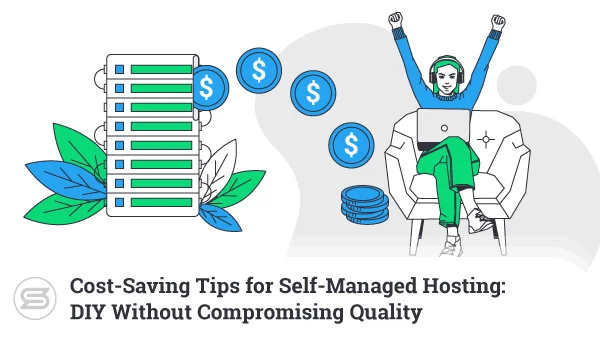Choosing An Operating System For Your VPS
Perhaps the single most defining element of your Virtual Private Server (VPS) hosting account is the Operating System (OS). The reason being is that the OS will influence many things, from the way you configure the environment to what applications you can use.
It’s also important to note that in the discussion that follows in this article, we are looking towards the OS from a web server point of view. This may result in possible confusion at times as some server use may offer differing views from the traditional desktop standpoint of an OS.
Windows or Linux
Two of the most commonly available OS in the VPS market space are Windows and Linux. By nature, they are very different in many aspects. For example, Windows Servers are typically more expensive to deploy but it has the edge if you’re planning to make use of ASP or other Microsoft-centric applications.
Linux on the other hand has lower start up costs since many distributions are under GNU or other similar free licensing schemes. It is also recognized as being able to perform better than Windows Server and is more modular in nature.
Unless you’re planning on using anything that absolutely has to run on the Windows platform, it is advisable to go with one of the various Linux options instead.
CentOS, Ubuntu, Debian, Fedora or Red Hat Enterprise Linux?
Before we begin this section, it’s important to understand that Linux itself is made up of several modular components. At its heart is the Linux kernel, which essentially does not really differ between the various distributions.
Aside from the kernel, a complete Linux distribution also includes:
- package managers,
- display servers,
- desktop environments, and other components.
Ultimately, the things included with each distribution contribute towards the overall goal that was intended for it.
There are literally hundreds of different Linux distributions existing today. However, not all are suitable for use as an OS in a VPS environment. Today we’re going to look at a few of the most popular choices for VPS:
- CentOS,
- Ubuntu,
- Debian,
- Fedora, and Red Hat Enterprise Linux
Compared by Criteria
Of the few distributions listed above, we can further narrow them down into closer groups. This is because of their relationship to one another.
For example, Red Hat Enterprise is derived from Fedora, while CentOS is derived from Red Hat Enterprise. As a result, these three distributions are closely linked. Meanwhile, Ubuntu was derived from Debian, which links those two closer together.
1 Easiness of Use
Among all Linux distributions, Ubuntu is widely recognized as being one of the easiest to use. A major focus of this distribution has always been usability. It comes with a very intuitive desktop environment interface and as far as possible avoids needing the user to move to the command line to achieve anything.
The installation process is also extremely seamless and generally free of overly technical jargon that Linux is often associated with. Hardware issues are resolved thanks to an auto detect feature that’s able to adapt to various systems.
Because of this, Ubuntu has a large community following. This in turn leads to further ease in use since anything you can’t do – likely someone else in the community will know how. Assistance is never that far away.
2 Functionality
It can be difficult to differentiate in functionality among Linux distributions. This is due to the modularity that the OS as a whole exhibits. However, taking into consideration a default installation, Red Hat Enterprise is by far the most complete.
Because of its Enterprise-class target market, it comes pre-packaged for almost all mission-critical use. However, it’s worth noting that this is also one of the few Linux distributions that is commercial.
3 Performance
Despite its ease of use, Ubuntu is also widely considered as the best performance for server (and hence, VPS) operations. Part of this is because of its streamlined release in targeted distributions. For VPS, you can use Ubuntu Server for best performance.
Of course, a big part of performance is also attributed to hardware, so choosing a reliable hosting company to deploy your VPS on is advisable. ScalaHosting Managed Cloud VPS for example offers high availability and reliability, running enterprise-class SSDs for the best in performance.
4 Features Offered
Red Hat Linux Enterprise is often preferred for its comprehensive feature set when it comes to the server market. This makes it much more suitable by default for the VPS environment given its complete feature set. The thing to keep in mind though is that its commercial licensing makes broad availability a bit more limited.
Because of this, many users tend to gravitate towards Ubuntu as the most feature-rich choice to run on their VPS hosting plans.
5 Installable Applications
One common mistake that many beginners make is assuming all packages or applications will work across the entire range of Linux distributions. While in a broad sense this may be true, there are many exceptions.
The Linux community is massive and it is typical that fans of each distribution stick to those only. Smaller applications developed by the various communities abound and in many cases, these are custom-created for individual Linux distributions.
Because of this highly complex system, it is preferable to choose your preferred Linux flavor based on your needs, rather than how many applications are installable on it. A good indicator of the number of installable applications though, would be popularity of distribution – which again, lends preference to Ubuntu.
One major point of note for those in favor of Ubuntu though, is that this Linux distribution is not able to support the use of cPanel. While this may seem like a disadvantage, it can easily be negated by using a highly capable cPanel alternative such as ScalaHosting’s SPanel.
6 Configuration
Ubuntu’s inclusion of a highly capable hardware detection feature by itself already removes much of the strain of configuring an operating system. However, it is the overall ease of use of the entire distribution that truly makes it much easier for overall configuration.
Even the server version can be equipped with a GUI interface for easier deployment and configuration of various packages. This includes other core VPS necessities such as the web server, database, and support for other things like PHP.
If you do so however, it is recommended for use only briefly and removed when the VPS moves to a production environment. This is because GUIs are heavily resource intensive and can occupy resources needed for whatever you are deploying on the VPS host.
7 Pre-installed packages
Each Linux distribution comes with its own default list of pre-installed packages. To see which packages are on your Linux installation, use the following commands:
For Debian/Ubuntu
apt list –installed
For Fedora/Red Hat Enterprise/CentOS
sudo yum list installed
Although this is helpful, there are variations of the commands which might prove more precise for your needs. For example, searching to see if a particular package is installed or creating a file with all the installed packages listed in it.
Conclusion
As you can probably tell by now, Ubuntu is likely one of the first Linux distributions you will likely adopt for your VPS hosting. A big part of the reason why is its ease of use, versatility, and of course, high amount of community support.
However, the CentOS family branch also has a large following and is more deeply embedded in the server market space. This makes it another top contender for use in VPS hosting.
At the end of the day, much boils down to your individual preferences. Since your VPS account is up to you to configure, why not take the time and experiment?


FAQs
Which Operating System is best for web hosting?
Linux is typically the preferred OS when it comes to web hosting. A big part of this is because of its mostly non-commercial nature, bolstered by superior performance, scalability, and overall stability.
How do I choose a VPS?
VPS hosting is known for its scalability, security, and performance. However, not all VPS hosting is equal. ScalaHosting runs its VPS plans on the Cloud and gives users the opportunity to leverage on itself-developed proprietary technologies like SPanel.
Which is better, VPS or dedicated server?
Unless it’s absolutely necessary for you to have all the resources that dedicated servers offer, VPS is generally a better choice. VPS hosting is much easier to manage than a dedicated server and comes at a fraction of the price.
What is the best Linux distribution for VPS?
Much of this depends on individual preference. However, it is generally accepted that Ubuntu Server is the most popular Linux distribution for web servers, followed by Red Hat Enterprise Linux for those operating in enterprise-class environments.
Which is better, CentOS or Ubuntu?
Although Ubuntu is preferred by many more people, it also comes along with a high frequency of updates compared to CentOS. This may result in increased management time needed to handle the updates on an Ubuntu deployment.



